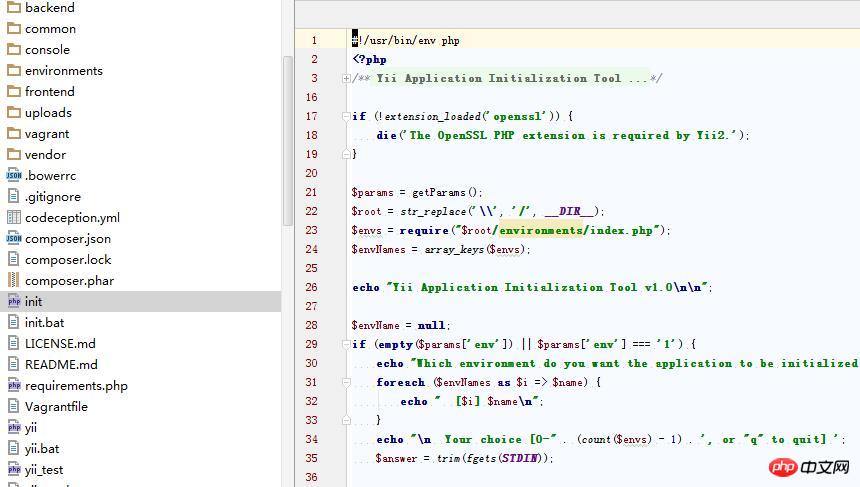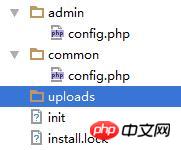PHP website automatic configuration
I have been using yii2 for projects, and I have used automated configuration, but I have never configured it myself. I had nothing to do at noon and took a look at the initialization code of yii, and found that it was all php!
 yii2Initialize the projectCode
yii2Initialize the projectCode
So, our project can definitely be done with php, so I created a new folder named autoConfig, An init was created inside, and the following code was written in it:
if(!file_exists('./uploads/')){ if(!mkdir('./uploads/')){ echo 'fail to make ./uploads/ file!'; }else{ echo 'make ./uploads/ success!'; } }Copy after login
It is a very simple code that automatically creates the uploads folder. When the uploads folder does not exist, uploads is automatically created. folder. We execute in the terminal:
 Automatically create configuration
Automatically create configuration
Open the same-level directory and find that the uploads folder has been created. Therefore, if we want to create configuration information, we can directly use php code to configure it. There is nothing very profound.
I will write another demo2:
Goal:
1.Create the uploads directory in the root directory of the website
2.Copy config.php from the common directory Put the template into the admin directory
3. Generate an install.lock file in the root directory
4. If the website is initialized, it mustdelete install.lock in the root directory, otherwise it cannot be initialized repeatedly
Okay, let’s take a look at our current directory structure:

Change the init code to the following:
<?php //设置长连接,以便可视化看到每个步骤执行情况 header("Connection: Keep-Alive"); header("Proxy-Connection: Keep-Alive"); set_time_limit(0); /*判断是否重复初始化*/ if(file_exists('./install.lock')){ echo '系统已经初始化过了,如果要重新初始化,请删除install.lock'."<br>"; } /*创建uploads文件夹*/ if(!file_exists('./uploads/')){ if(!mkdir('./uploads/')){ echo '无法在根目录创建uploads文件夹'."\n"; }else{ echo 'uploads文件夹创建成功'."\n"; } /*创建/admin/config.php文件*/ if(!file_exists('./admin/config.php')){ if(copy('./common/config.php','./admin/config.php')){ echo 'admin/config.php创建成功!'."\n"; }else{ echo 'admin/config.php创建失败!'."\n"; } } /*生成安装锁install.lock*/ touch('install.lock'); echo '配置结束,如果有配置失败的,请手工执行'."\n"; clearstatcache(); } ?>Copy after login
Execute in the terminal:

Effect:

Obviously, admin/config.php has been created, the uploads directory has also been created, and install.lock also exists. Automated configuration with PHP is so simple!
The above is the detailed content of PHP website automatic configuration. For more information, please follow other related articles on the PHP Chinese website!

Hot AI Tools

Undresser.AI Undress
AI-powered app for creating realistic nude photos

AI Clothes Remover
Online AI tool for removing clothes from photos.

Undress AI Tool
Undress images for free

Clothoff.io
AI clothes remover

AI Hentai Generator
Generate AI Hentai for free.

Hot Article

Hot Tools

Notepad++7.3.1
Easy-to-use and free code editor

SublimeText3 Chinese version
Chinese version, very easy to use

Zend Studio 13.0.1
Powerful PHP integrated development environment

Dreamweaver CS6
Visual web development tools

SublimeText3 Mac version
God-level code editing software (SublimeText3)

Hot Topics
 1385
1385
 52
52
 Alipay PHP SDK transfer error: How to solve the problem of 'Cannot declare class SignData'?
Apr 01, 2025 am 07:21 AM
Alipay PHP SDK transfer error: How to solve the problem of 'Cannot declare class SignData'?
Apr 01, 2025 am 07:21 AM
Alipay PHP...
 Explain JSON Web Tokens (JWT) and their use case in PHP APIs.
Apr 05, 2025 am 12:04 AM
Explain JSON Web Tokens (JWT) and their use case in PHP APIs.
Apr 05, 2025 am 12:04 AM
JWT is an open standard based on JSON, used to securely transmit information between parties, mainly for identity authentication and information exchange. 1. JWT consists of three parts: Header, Payload and Signature. 2. The working principle of JWT includes three steps: generating JWT, verifying JWT and parsing Payload. 3. When using JWT for authentication in PHP, JWT can be generated and verified, and user role and permission information can be included in advanced usage. 4. Common errors include signature verification failure, token expiration, and payload oversized. Debugging skills include using debugging tools and logging. 5. Performance optimization and best practices include using appropriate signature algorithms, setting validity periods reasonably,
 Describe the SOLID principles and how they apply to PHP development.
Apr 03, 2025 am 12:04 AM
Describe the SOLID principles and how they apply to PHP development.
Apr 03, 2025 am 12:04 AM
The application of SOLID principle in PHP development includes: 1. Single responsibility principle (SRP): Each class is responsible for only one function. 2. Open and close principle (OCP): Changes are achieved through extension rather than modification. 3. Lisch's Substitution Principle (LSP): Subclasses can replace base classes without affecting program accuracy. 4. Interface isolation principle (ISP): Use fine-grained interfaces to avoid dependencies and unused methods. 5. Dependency inversion principle (DIP): High and low-level modules rely on abstraction and are implemented through dependency injection.
 How to automatically set permissions of unixsocket after system restart?
Mar 31, 2025 pm 11:54 PM
How to automatically set permissions of unixsocket after system restart?
Mar 31, 2025 pm 11:54 PM
How to automatically set the permissions of unixsocket after the system restarts. Every time the system restarts, we need to execute the following command to modify the permissions of unixsocket: sudo...
 Explain the concept of late static binding in PHP.
Mar 21, 2025 pm 01:33 PM
Explain the concept of late static binding in PHP.
Mar 21, 2025 pm 01:33 PM
Article discusses late static binding (LSB) in PHP, introduced in PHP 5.3, allowing runtime resolution of static method calls for more flexible inheritance.Main issue: LSB vs. traditional polymorphism; LSB's practical applications and potential perfo
 How to send a POST request containing JSON data using PHP's cURL library?
Apr 01, 2025 pm 03:12 PM
How to send a POST request containing JSON data using PHP's cURL library?
Apr 01, 2025 pm 03:12 PM
Sending JSON data using PHP's cURL library In PHP development, it is often necessary to interact with external APIs. One of the common ways is to use cURL library to send POST�...
 Framework Security Features: Protecting against vulnerabilities.
Mar 28, 2025 pm 05:11 PM
Framework Security Features: Protecting against vulnerabilities.
Mar 28, 2025 pm 05:11 PM
Article discusses essential security features in frameworks to protect against vulnerabilities, including input validation, authentication, and regular updates.
 How to debug CLI mode in PHPStorm?
Apr 01, 2025 pm 02:57 PM
How to debug CLI mode in PHPStorm?
Apr 01, 2025 pm 02:57 PM
How to debug CLI mode in PHPStorm? When developing with PHPStorm, sometimes we need to debug PHP in command line interface (CLI) mode...




